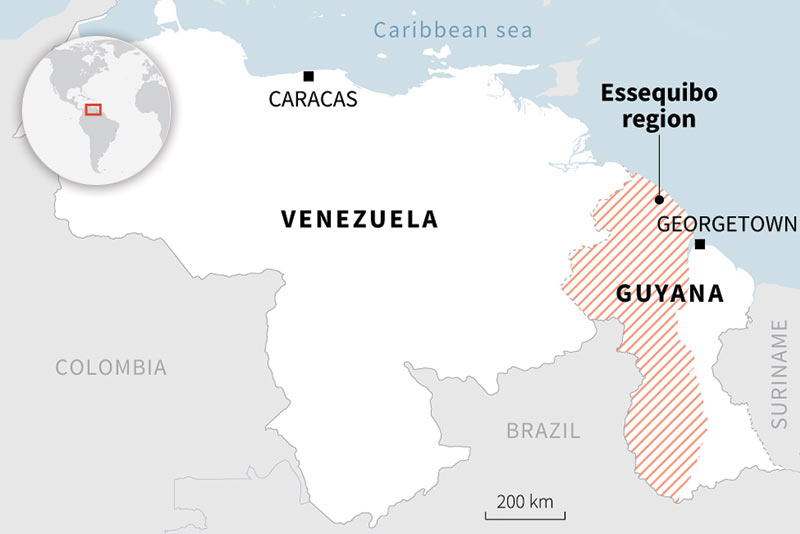- World
- Dec 29
Explainer - Guyana-Venezuela conflict over Essequibo region
• Britain will deploy a naval ship off Guyana, its ministry of defence said, as the South American nation faces a border dispute with neighbour Venezuela over the oil-rich Essequibo region.
• Earlier this month, Guyana and Venezuela agreed to avoid any use of force and to not escalate tensions in their long-running dispute over the oil-rich Esequibo area after a meeting between their heads of state in Saint Vincent and the Grenadines.
• Guyana and Venezuela agreed earlier this month to avoid any use of force and not to escalate tensions in the long-running dispute.
• The 160,000-square-km Essequibo region is generally recognised as part of Guyana, but in recent years Venezuela has revived its claim to the territory and to offshore areas after major oil and gas discoveries.
Brief history of the conflict
• The dispute dates back to a series of events that took place during the second half of the 19th century when Guyana was still a British colony, known as British Guiana.
• At that time, the United Kingdom and Venezuela both claimed the territory located between the mouth of the Essequibo River in the east and the Orinoco River in the west.
• In the 1890s, the USA encouraged both parties to submit their territorial claims to arbitration.
• In 1897, an arbitral tribunal was established to settle the boundary between British Guiana and Venezuela.
• In its Award rendered on October 3, 1899, the arbitral tribunal granted the entire mouth of the Orinoco River and the land on either side to Venezuela.
• It granted to the United Kingdom the land to the east extending to the Essequibo River.
• Between November 1900 and June 1904, a joint Anglo-Venezuelan commission demarcated the boundary established by the 1899 Award.
• On January 10, 1905, after the boundary had been demarcated, the British and Venezuelan commissioners produced an official boundary map and signed an agreement accepting that the co-ordinates of the points listed were correct.
• On February 14, 1962, Venezuela informed the UN Secretary-General that it considered there to be a dispute between itself and the United Kingdom “concerning the demarcation of the frontier between Venezuela and British Guiana”.
• The UK government asserted that “the Western boundary of British Guiana with Venezuela had been settled by the award which the arbitral tribunal announced on October 3, 1899”, and that it did not “agree that there could be any dispute over the question settled by the award”.
• After various attempts to resolve the matter failed, the representatives of the United Kingdom, Venezuela and British Guiana signed the Geneva Agreement on February 17, 1966.
• Guyana gained independence from the United Kingdom on May 26, 1966.
• Having attained independence, Guyana became a party to that agreement.
• Attempts were made in the ensuing decades to resolve the dispute through different means of settlement envisaged in the Geneva Agreement, all of which failed, leading the Secretary-General of the United Nations, in January 2018, under the Geneva Agreement, to choose the Court as the means to resolve the dispute.
• In June 2018, Venezuela stated that the Court lacked jurisdiction to hear the case and announced that it would not be participating in the proceedings.
• In December 2020, the Court found that it had jurisdiction to entertain the application filed by Guyana.
Significance of Essequibo region
• There have been major offshore discoveries of crude and gas nearby in recent years, putting Guyana on the world map of oil producers.
• A consortium by ExxonMobil, China’s CNOOC and US Hess began oil production in Guyana in 2019.
• Oil production is currently at some 400,000 barrels-per-day (bpd) of oil and gas and is expected to rise to more than 1 million bpd by 2027. It has sharply boosted Guyana’s economy and promises huge income for the country over the coming years.
• Though Venezuela sits on the world’s largest crude reserves and also has massive deposits of natural gas, its production has fallen significantly in recent years on US sanctions, alleged corruption and deteriorated infrastructure.
• Tensions rose sharply this month after voters in a Venezuelan referendum backed a move to make the Essequibo area a new Venezuelan state and rejected the jurisdiction of the International Court of Justice (ICJ), which is hearing the case between the two countries.
• Venezuelan President Nicolas Maduro had said he would authorise oil exploration in the Essequibo region.
• The two countries will continue their dialogue in Brazil within the next three months.
Manorama Yearbook app is now available on Google Play Store and iOS App Store


